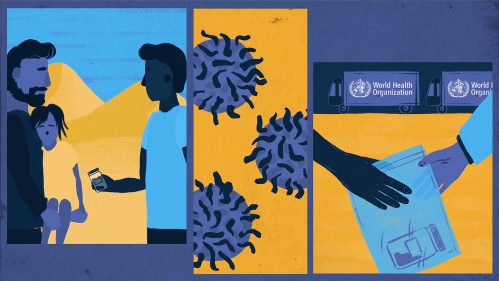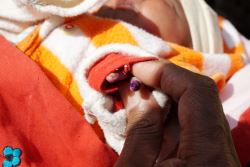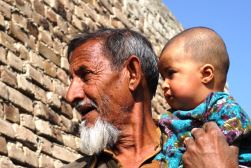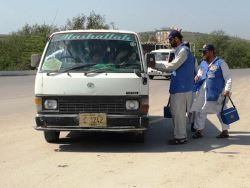Related articles
Innovations in reverse cold-chain building resilience for disease surveillance in Sudan
A new approach is helping to improve Sudan’s ability to identify the poliovirus and remain polio-free, despite challenges
 Innovative approaches are improving the reverse cold chain in Sudan, the process by which stool samples from potential polio cases are transported carefully to a laboratory. WHO.
Innovative approaches are improving the reverse cold chain in Sudan, the process by which stool samples from potential polio cases are transported carefully to a laboratory. WHO.
16 November 2017 – It starts with a sick child, whose arms or legs have suddenly become weak and floppy. A trip to the local health centre, which could be many miles away, confirms that the child is showing classic signs of acute flaccid paralysis. This is one of the key indicators for poliovirus and kick starts the polio surveillance system into action.
Strong surveillance to identify every case of acute flaccid paralysis is the golden standard of the polio eradication programme. In countries like Sudan, where the last case of wild poliovirus was seen in March 2009, it remains critical. Even though Sudan is now polio-free, it remains at risk of reimporting the virus, so a high level of vigilance is needed while polio continues to circulate anywhere in the world.
The importance of strong surveillance in Sudan
Amid outbreaks of acute watery diarrhoea, severe malnutrition in children under 5, large-scale internal population displacement and an influx of more than 1 million refugees from South Sudan due to conflict, Sudan has managed to maintain a strong surveillance system for polio. Despite these challenges, global surveillance standards – which tell a country whether their system is sensitive enough to catch polio circulating in communities – continue to be met.
But polio remains a threat to every child, everywhere, until it is stopped for good. Today, only 3 countries remain polio endemic – Pakistan, Afghanistan and Nigeria. Countries like Sudan that are close by, with low routine immunization rates, weak health infrastructure or facing conflict and population displacement, remain at a higher risk of polio finding its way back.
The role of the reverse cold chain for surveillance
When any case of acute flaccid paralysis is found anywhere in the world, stool samples from the affected child must be transported carefully to the laboratory so that they can be tested to identify whether the poliovirus was the cause.
Mr Jaouad Tilout, from the WHO Regional Office for the Eastern Mediterranean polio eradication programme, explains that this journey undertaken by each sample is known as the ‘reverse cold chain’. “If a cold chain is what you call the transport chain that goes from a laboratory to the field – where vaccines must be kept at a certain temperature from the moment they are produced, until they are administered in order for them to work – a reverse cold chain is the process of stool samples that need to be tested getting back to the laboratory from the field at certain temperatures so that the virus that might be in the sample will still be identifiable.”
Innovations in the reverse cold chain
With support from Global Polio Eradication partners, Sudan is part of a pilot study of a new device that aims to ensure stool samples collected from acute flaccid paralysis cases reach Sudan’s National Poliovirus Laboratory in the right condition for effective testing.
Mr Jaouad Tilout says that the pilot study aims to assess whether specimens being transported are meeting global guidelines and introduce continual temperature recording probes known as ‘LogTags’ to track specimens during their journey to the lab.
Dr Christopher Hsu, from the Centers for Disease Control (CDC), and Mr Tilout co-led a 2-day workshop in Khartoum to train public health staff on the use of the new tool.
“This is a really important innovation that could be implemented in other countries of the Region, such as Yemen and Somalia, to assess their reverse cold-chain too. It’s a critical process in the end game for polio because we are looking to keep any potential poliovirus alive in the stool specimen so it can be properly notified by the laboratory,” Mr Tilout says.
The LogTag training has been delivered to 20 health staff from Sudan’s National and State health offices, the National Polio Laboratory, and the WHO Sudan country office. The study will be conducted over the next 6 to 12 months with the goal of collecting approximately 250–300 LogTag measurements. Findings from this assessment will be used to give feedback to state polio surveillance officers on any deviation from reverse cold-chain parameters.
La frontière ultime à l'éradication de la poliomyélite
En cette Semaine mondiale de la vaccination, le but mondial de l’éradication de la poliomyélite est plus proche que jamais, même si davantage d’efforts doivent encore être déployés pour un monde exempt de la maladie.
 Pour un monde exempt de poliomyélite, chaque enfant vivant dans les derniers réservoirs de la maladie (Pakistan et Afghanistan) doit être vacciné. Le point d’encre mauve appliqué sur le doigt de ce nourrisson indique qu'il a reçu le vaccin antipoliomyélitique oral. Crédits photo : OMS28 avril 2016 – La Semaine mondiale de la vaccination 2016 de l'Organisation mondiale de la Santé (OMS) a démarré cette semaine avec pour objectif de sensibiliser la communauté internationale à l'importance majeure d'une couverture vaccinale complète de l'enfance jusqu'à l'âge adulte. L'un des axes principaux de la campagne est le poliovirus invalidant, qui provoque une maladie incurable, mais qui peut être évitée par un simple vaccin. La Semaine mondiale de la vaccination est l’occasion de célébrer les progrès que représente la baisse de 99,9 % des cas survenue au cours des 30 dernières années, mais aussi d’inciter à passer à la vitesse supérieure pour donner l’impulsion finale nécessaire à l’éradication des dernières poches du virus et donc de la maladie.
Pour un monde exempt de poliomyélite, chaque enfant vivant dans les derniers réservoirs de la maladie (Pakistan et Afghanistan) doit être vacciné. Le point d’encre mauve appliqué sur le doigt de ce nourrisson indique qu'il a reçu le vaccin antipoliomyélitique oral. Crédits photo : OMS28 avril 2016 – La Semaine mondiale de la vaccination 2016 de l'Organisation mondiale de la Santé (OMS) a démarré cette semaine avec pour objectif de sensibiliser la communauté internationale à l'importance majeure d'une couverture vaccinale complète de l'enfance jusqu'à l'âge adulte. L'un des axes principaux de la campagne est le poliovirus invalidant, qui provoque une maladie incurable, mais qui peut être évitée par un simple vaccin. La Semaine mondiale de la vaccination est l’occasion de célébrer les progrès que représente la baisse de 99,9 % des cas survenue au cours des 30 dernières années, mais aussi d’inciter à passer à la vitesse supérieure pour donner l’impulsion finale nécessaire à l’éradication des dernières poches du virus et donc de la maladie.
Les experts participant à cette Semaine mondiale de la vaccination se montrent assez confiants sur l'éventualité proche d'assister à la disparition du virus. En 2015, un total de 74 cas de poliomyélite a été rapporté en Afghanistan et au Pakistan, les deux seuls pays d’endémie restants de la poliomyélite, contre 334 cas dans le monde en 2014.
« Nous avons parcouru un long chemin depuis la création de l’Initiative mondiale pour l’éradication de la poliomyélite en 1988, passant de 125 pays d’endémie de la poliomyélite à seulement deux », déclare Chris Maher, responsable de l’Unité régionale pour l’éradication de la poliomyélite à Amman (Jordanie). « Nous nous trouvons au stade de l’ultime frontière pour l’éradication. Il nous reste encore bien du travail à accomplir, mais si nous pouvions stopper la transmission en Afghanistan et au Pakistan d’ici fin 2016, le monde pourrait enfin être exempt du poliovirus sauvage. »
Alors que la pression monte pour atteindre ce but historique – le deuxième de ce type depuis l’éradication de la variole il y a un peu plus de 30 ans – les regards sont braqués sur l’Afghanistan et le Pakistan, les deux pays qui permettront au monde de passer la ligne d’arrivée.
Faire grimper la demande de vaccin antipoliomyélitique au niveau communautaire
Dans les deux pays, le redoublement des efforts dans la lutte contre la poliomyélite a conduit à d’importants progrès. Pour autant, des obstacles demeurent : malgré des campagnes de vaccination de masse régulières dans les deux pays, atteindre les enfants qui échappent systématiquement au vaccin antipoliomyélitique oral (VPO) et dispenser des services de santé de qualité demeurent des défis de taille. En Afghanistan, les conflits, les terrains difficilement praticables et l’insécurité continuent d’entraver l’accès à ces enfants, contribuant à la création et au maintien de réservoirs de transmission du poliovirus, bien que le programme s’efforce de conserver sa neutralité pour assurer le soutien de tous les acteurs clé et pour obtenir les meilleurs résultats pour les enfants. Au Pakistan, les importants mouvements de population vers des zones où le virus persiste et vers les poches d’enfants sous-vaccinés continuent de constituer un risque à la transmission du virus.
 Le rôle des parents dans l’éradication de la poliomyélite est crucial : ce sont eux qui doivent s’enquérir des moyens de faire vacciner leurs enfants. Afin d’améliorer la qualité des campagnes et l’acceptation de l’importance des vaccins par le public, l’OMS et les partenaires de l’Initiative mondiale pour l’éradication de la poliomyélite – l’UNICEF, Rotary International, les Center for Disease Control and Prevention et la Fondation Bill etMelindaGates – travaillent en étroite collaboration avec les gouvernements nationaux et les responsables communautaires pour booster la demande de VPO et dissiper les fausses rumeurs autour du vaccin.
Le rôle des parents dans l’éradication de la poliomyélite est crucial : ce sont eux qui doivent s’enquérir des moyens de faire vacciner leurs enfants. Afin d’améliorer la qualité des campagnes et l’acceptation de l’importance des vaccins par le public, l’OMS et les partenaires de l’Initiative mondiale pour l’éradication de la poliomyélite – l’UNICEF, Rotary International, les Center for Disease Control and Prevention et la Fondation Bill etMelindaGates – travaillent en étroite collaboration avec les gouvernements nationaux et les responsables communautaires pour booster la demande de VPO et dissiper les fausses rumeurs autour du vaccin.
« Le programme de lutte antipoliomyélitique n’engage pas seulement les responsables et les professionnels de la santé, il mobilise également le soutien de hauts chefs religieux d’influence pour atteindre les communautés », rappelle le Dr Richard Peeperkorn, Représentant de l’OMS en Afghanistan. « Une conférence récente d’oulémas tenue à Kaboul a rassemblé les responsables religieux de tout l’Afghanistan et a conduit à une déclaration publique encourageant les dispensateurs de soins à vacciner les enfants contre la poliomyélite et d’autres maladies à prévention vaccinale. Des conférences d’oulémas seront organisées dans cinq régions au cours des mois à venir afin de renforcer davantage le rôle de sensibilisation des responsables religieux dans la lutte contre la poliomyélite », ajoute-t-il.
L’OMS, accompagné de ses partenaires, soutient actuellement la formation de 65 000 professionnels de terrain afghans spécialisés dans la lutte antipoliomyélitique sur la base d’un programme de formation revu récemment pour renforcer leurs compétences en matière de vaccination, de surveillance des cas de paralysie flasque aiguë, de suivi de campagne et d’échanges interpersonnels. Les professionnels de terrain sont des membres de la communauté qui inspirent confiance et qui ont à cœur la bonne santé des enfants de leurs communautés, ce qui maximise leur aptitude à jouer un rôle de premier ordre dans l’impulsion finale pour éradiquer la poliomyélite.
Au Pakistan, les campagnes de publicité pour encourager la confiance de la communauté envers les agents de vaccination antipoliomyélitique ainsi que leur protection contribuent à améliorer la couverture dans les zones où se trouvent des populations qui refusent la vaccination. « Bien que les cas de refus ne soient pas un phénomène répandu au Pakistan, en venir à bout là où ils posent un problème est nécessaire pour l’éradication », explique le Dr Michel J. J. Thieren, Représentant de l’OMS au Pakistan. « L’OMS soutient le gouvernement pakistanais et d’autres partenaires pour montrer que les agents de vaccination constituent le noyau dur des efforts d’éradication au niveau communautaire : ils inspirent confiance et sont acceptés par leur communauté, ce qui aide le programme de lutte antipoliomyélitique à convaincre les parents de recourir à la vaccination », ajoute-t-il.
Solutions logistiques pour atteindre davantage d’enfants
Outre le travail de plaidoyer et de sensibilisation communautaire, l’OMS et ses partenaires des deux pays travaillent constamment à peaufiner les questions de logistiques pour atteindre davantage d’enfants durant les campagnes. Des révisions apportées à la « stratégie de deuxième visite » mise en œuvre en Afghanistan et la mise en place d’équipes de vaccination fixes au niveau des points de passage de la frontière pakistano-afghane a permis d’atteindre des enfants en déplacement.
« Chaque jour de la campagne, en fin de journée, les équipes de vaccination retournent dans les foyers où les enfants ont été manqués. À la fin de chaque campagne, les vendredis sont également consacrés aux revisites pour atteindre les familles durant les pique-niques, sur les marchés publics et dans les mosquées, et ainsi administrer des gouttes de VPO aux enfants qui n’étaient pas à la maison lors de la première visite », rapporte le Dr Peeperkorn. « Ce type d’activité de « ratissage » s’est révélé très efficace dans la réduction du nombre d’enfants manqués », dit-il.
 Une équipe en poste de transit permanent opérant au niveau du tunnel de Kohat dans la province de Khyber Pakhtunkhwa fait signe à des voitures de s’arrêter afin de vacciner des enfants en route vers l’Afghanistan.« La proximité des deux pays fait de l’importation de la poliomyélite un défi permanent », indique le Dr Thieren. « Un grand nombre d’enfants de moins de 5 ans passent les frontières, ce qui conduit à la double circulation du poliovirus sauvage dans les deux corridors, avec un phénomène ping-pong entre les zones frontalières des deux pays. L’une des stratégies pour réduire la transmission transfrontalière au sein des populations mobiles à haut risque consiste à s’assurer que les équipes de vaccination sont positionnées dans les zones d’importants mouvements de population », précise-t-il.
Une équipe en poste de transit permanent opérant au niveau du tunnel de Kohat dans la province de Khyber Pakhtunkhwa fait signe à des voitures de s’arrêter afin de vacciner des enfants en route vers l’Afghanistan.« La proximité des deux pays fait de l’importation de la poliomyélite un défi permanent », indique le Dr Thieren. « Un grand nombre d’enfants de moins de 5 ans passent les frontières, ce qui conduit à la double circulation du poliovirus sauvage dans les deux corridors, avec un phénomène ping-pong entre les zones frontalières des deux pays. L’une des stratégies pour réduire la transmission transfrontalière au sein des populations mobiles à haut risque consiste à s’assurer que les équipes de vaccination sont positionnées dans les zones d’importants mouvements de population », précise-t-il.
L’Afghanistan revoit également ses microplans en vue d’obtenir des données déterminantes sur la taille et la localisation des populations cibles dans différentes zones. Des microplans révisés et précis constituent le pilier de la réussite des campagnes de vaccination antipoliomyélitique en ce qu’ils déterminent la quantité de vaccins requise, le nombre de professionnels de santé nécessaire et les besoins en matière de transport, ce qui contribue à garantir que chaque enfant soit atteint par les équipes de vaccination antipoliomyélitique.
Maintenir la pression
Malgré ces progrès, il reste beaucoup à faire, non seulement en Afghanistan et au Pakistan, mais aussi dans les pays où les taux de vaccination sont en baisse. Tant que le poliovirus continue de circuler où que ce soit, le risque existe pour les enfants où qu’ils se trouvent.
« Nous ne pouvons pas nous permettre de lever le pied maintenant », déclare le Dr Maher. « L’OMS et les partenaires de l'Initiative d'éradication de la poliomyélite vont continuer de soutenir ces deux pays pour que le travail soit fait. Il est également important que le soutien plus large de la communauté internationale ne faiblisse pas » ajoute-t-il.
L’Afghanistan et le Pakistan mèneront leurs prochaines campagnes de vaccination nationales en mai. Cette année, il n’y a eu que 12 cas de poliomyélite, contre 23 cas sur la même période en 2015.
La Semaine mondiale de la vaccination se déroule entre les 24 et 30 avril et a pour thème « Combler l’écart en matière de vaccination ».








